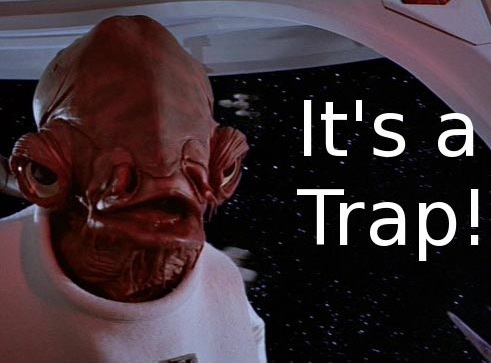Quitting the Day Job, and the Success Trap
That's right. Turn out the lights, lock the doors, change the passwords on the computers. Come February 19, I'll no longer be a writer bot at my day job, trading in the cube farm for the wide open spaces of...the narrow workspace I've carved out of my house's storage room. But, hell, at least it's my narrow workspace.
What this all means is that, in two weeks’ time, I’ll be a full-time freelance writer for the first time in my life. It’s a dream come true. It’s exhilarating. It’s terrifying. And, truth be told, it’s something I started to believe would never, ever happen.
Like most writers, the path that led me to financial sustainability was not a direct one. Or an easy one. While I've been beyond lucky to enjoy some really cool successes along the way, the path was oftentimes a very challenging one, filled with disappointment, anger, doubt, and flat out heartbreak. But, I did learn a thing or two along the way, and that's what this post is all about. So, let’s cue the Wayne’s World flashback distortion effect and go to the past…
I published my first comic—which also marked my first foray in genre fiction after years of writing stuffy (and bad) literary fiction—in 2006. It was a three page short called Rank and File with art by Keith Burns, my first ever collaborator and still good friend to this day (years later, we worked together on a book called ReincarNATE, which is being developed as a TV series—some big news coming soon on this—and rereleased by Heavy Metal later this year before a new series launches in late 2016). Rank and File was published in a cool UK anthology called FutureQuake, and the experience went well enough that I was able to publish another short in FutureQuake’s sister publication, Something Wicked. Though, for the life of me, I can’t remember what that short was titled. It was with Keith again, I do remember that.
Two years later, I signed my first publishing deal for a full-length graphic novel, and I thought, without question, that this was my big break. I’d be a full-time writer from that point on, getting great gigs, doing my own projects, all the things that make for a stable career.
That didn’t happen. I never even got close.
This idea of the next thing, whatever it was—be it Hoax Hunters, Planet of the Apes, Curse, anything—being the break that would free me from my day job dogged me for the better part of my career. That ambition somehow became the only thing that would validate what I did and why I did it. If I wasn’t writing as a profession—meaning, if it wasn’t my full-time job, if it wasn’t what financially supported my life—then I was a failure. And the more I pinpointed my focus on this idea that I only counted—that my work only counted—insofar as it was my profession, in the strictest sense, started to distort my sense of purpose as a writer. Rather than do work because I loved it, I did it for myriad other reasons—to make a quick payday, to catch the eyes of editor, to engage in this strange arms race that exists amongst my comic peers, where the goal is to secure as many jobs as possible, regardless of the reasons why. And the more this goal slipped away from me, the unhappier I became. I wasn’t a professional writer, and I wasn’t always doing things that I loved. At times, I found myself wondering what, in fact, I did have, and why I was working as a writer at all.
See, being a comics writer can be a very strange thing. We all live in the long shadow cast by Marvel and DC, for better or worse. I don’t mean that as a criticism, at all, but the fact is that they are the surest way to make a stable career, as a writer, letterer, artist, or colorist. They pay the best rates, they’ll never go out of business, they even offer health insurance (to some). There’s more complexities to the comic market and how to make a career, but nothing will change the fact that an exclusive contract with either Marvel or DC will provide a stable income. That opportunity, and their presence, creates a culture where everyone wants in—where everyone needs to get in—and because there’s no real direct path for getting there, what you get is a lot of young creators doing everything and anything they can to catch the eye of the right editor at the right time and get on the right book that propels their career to a whole new level. I know—I was one of these creators for a long time. Too long.
In my persistence, driven by the belief that a job at Marvel or DC would grant me some kind of spiritual deliverance, I found myself competing against myself to no end and competing against my peers, and friends, when there was no competition to be had. I let outside forces determine that terms of my own success, and it was one of the biggest mistakes I ever made.
After years of trying—chasing down editors at cons, sending emails to editors that never got returned, sharing my work with anyone who would look at it, all for the singular goal of becoming a professional comic book writer—I stopped. In part because I was worn out. In part because I’d lost my drive. But in part, also, because I regained some perspective. I had to remember why I wanted to be a writer, what drove me to sit at my computer night after night after night when I could have been doing countless other things, and how I wanted to define myself rather than be defined by someone else.
Now, I can talk about all the sacrifice inherent to being a freelance writer trying to make it. You give up time—time for your family, friends, and yourself; you open yourself up to a world of rejection and criticism from people you don’t even know; you work, intensely, on things you never know will see the light of day or mean anything to anyone. But the point of what I’m writing is to hopefully guide other writers out of the success trap. I fell into, hard. And I’ve seen it happens to my friends as well. It’s not a good place to be, professionally or creatively, but it’s so very easy to find yourself there.

Sorry, I couldn't help myself.
Once I stopped—once I realized the well I’d fallen into and pulled myself out of it—things changed. I started taking on less work and, instead, I pursued projects that were meaningful to me. I learned to shed the term of “comics writer” and simply call myself a “writer,” as there are so many other types of writing I truly enjoy doing. Novels, screenwriting, even journalism. I’m not saying there’s anything bad, or wrong, with being a comics writer. But for me, pursuing one thing, in one way, with one goal in mind created nothing but textbook tunnel vision. And the vision warped my perspective, purpose, and passion.
Now, I’m not brash enough to say that if you simply pursue what you love that everything will work out. I’ve been very, very lucky. The project I’m about to start working on—which is the main reason I was able to leave my day job behind—came to me with equal parts luck, hustle, and dedication. I had years of work and my reputation to fall back on, and combined with a few other factors, I was able to secure a job that is literally a dream made reality. The larger point of what I’m saying, though, is simple: Don’t narrow your journey so that you can only reach one possible destination. And, worse yet, don’t let that destination be decided on by anyone else but yourself. How you define success should be up to you and no one else. The success trap is real—don’t let it ensnare you.
SOME OTHER STUFF
As a way to thank Roche Limit readers, I enlisted some super talented friends to work on a Roche Limit short with me. Set in the Clandestiny time line, this story, called “The Fourth Expedition” was illustrated by Paul Tucker, colored by Dee Cunniffe and Tucker, lettered by Taylor Esposito, and has a cover by Tim Daniel. And, best of all, you can read it for FREE! Here’s the link.
Speaking of Roche Limit—please, please be sure to remind your comic shop to order issue #1. They can do so until Feb. 22nd, and the issue releases on March 16. Only four issues remain until the end!
And hey, more Roche Limit—here’s me holding the oversized hardcover French edition!




